When schools closed in March, parents and caregivers were immediately left figuring out how to balance work, childcare, and homeschooling their children. For the families who relied on the Food Bank every week, there was an added layer of stress – where would they get their groceries? Prior to shelter-in-place, many families could pick up the fresh groceries at their school pantry during drop-off or pick-up. Across San Francisco and Marin, school closures caused 46 of the Food Bank’s Healthy Children food pantries to stop their weekly distributions
One such pantry was at Dolores Huerta Elementary School in San Francisco’s Mission District. When the school closed teachers and staff quickly worked to identify and contact families to let them know where they could access food. Even with new available pop-up pantries opening nearby, with vulnerable relatives at home, some families could not attend nearby Pop-up pantries. The school’s Family Liaison, Nataly Terrazas; Elementary Advisor, Luis García; School Social Worker, Sarah Volk, and school parent and pantry coordinator, Casey Federico quickly sprang into action matching families who couldn’t leave their house with volunteers who could pick up and deliver food to them. They now have 30 volunteers who trade off delivering to 13 families.
Last week we caught up with Casey to learn more about what is happening in their community. 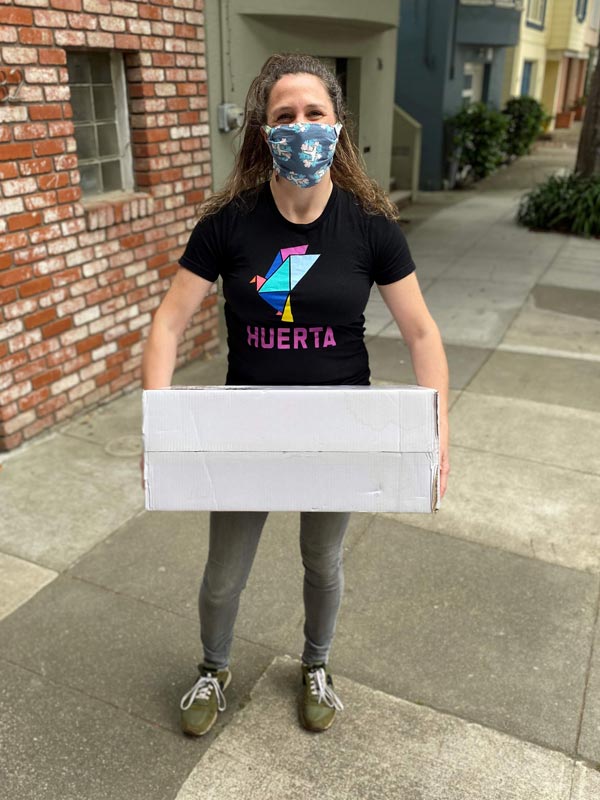
(This conversation was edited for length and clarity.)
Food Bank: How did you start partnering with us and what have you been doing since the start of the pandemic?
Casey Federico: At Dolores Huerta, which is both of my daughters’ elementary school, there was an established food pantry every Monday morning. Another parent had coordinated it before me, but their son graduated, so I took on the job of being the pantry coordinator this fall. Even before shelter-in-place, we were seeing a huge expansion in need for the pantry. We grew from a 50–person pantry last year to a 70- or 80-person pantry in November.
When the shelter-in-place happened, I was in communication with Edith, our neighborhood representative from the Food Bank, and knew everything was shifting. At the same time, I was getting all these texts and messages from families at the school saying, ‘we are about to be out of food’ There were lots of different challenging situations. And so, from discussions with the school team – Sarah, Luis, and Nataly – we found out who couldn’t leave their home for whatever reason and identified 12 families who needed food delivered. We started with a group of volunteers –families who did have transportation and could go to a food pantry and pick up a box and then deliver it to those people’s homes.
Our School Social Worker, Sarah Volk, is such an inspiration. She was just so careful and thoughtful about confidentiality. Sarah asked families who they’d be okay being paired with, because to have someone know you are receiving food from the Food Bank and then know where you live, that is a big deal. She was just super thoughtful about that and got everybody’s permission all along the line.
FB: What are you hearing from people in the community now?
CF: I’m still hearing a lot of people saying, you know, we got this [food], but it isn’t really enough. That is the hard reality. So many families that are part of our community are hospitality workers, etc.
Another amazing thing that happened is one of our teachers, her fiancé owns a restaurant and every time somebody from the community buys a meal in his restaurant, Toma, he’s donating a meal to a family in need. He’s also delivering meals. So, families are getting additional support from that too.
But what I just heard from Sarah last week, is just the numbers are increasing so much. So, we are talking about how to meet new needs. It’s really challenging.
FB: Do you talk to the families you deliver to? How are they doing?
CF: One thing that’s been really good, is a lot of relationships have been built between the families who are delivering and the families who are receiving. I know everybody’s been sending texts like, I’m going to drop it off. They text, I got it, thank you.
There’s also been some specific communication around needing health items like toothpaste and soap and tampons, and that kind of stuff. A few volunteers who have the capacity have also been sharing those types of items with families. Many of the families who are delivering are also out of work or running low on food themselves.
FB: We see this too, it’s incredible how many of our volunteers say, ‘oh yeah, I’m out of work right now and so I have free time and I’m going to do this.’
CF: I know, it just takes my breath away. One of the women who is helping deliver said ‘oh yeah, we both lost our jobs last week, but this is just so important, it’s the one trip I have purpose around. I have to do this.’
FB: Is there anything else that you wanted to share about the experience?
CF: I think the one thing that the Food Bank really does is bring together a community of people. Almost everybody who volunteered at the weekly food pantry at Dolores Huerta is also receiving a box of food. And so, I think our, our community of folks who really view themselves as part of the system were ready to jump in. The group of parents who help us to set up, fold up boxes, and do all that kind of stuff are really jumping up again to help out, which is cool.
That sort of friendly, joyful mood that was at our Monday morning pantry translates over and made people feel comfortable to be both asking and giving. I’m so proud to be part of this community!
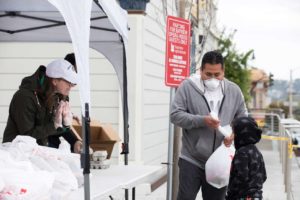 “I haven’t worked in a month,” said Doaldo, who worked in restaurants before the pandemic. “We don’t have money for food or anything.”
“I haven’t worked in a month,” said Doaldo, who worked in restaurants before the pandemic. “We don’t have money for food or anything.”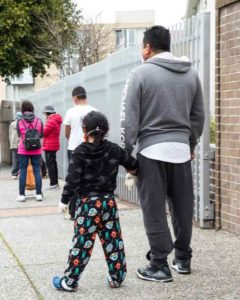




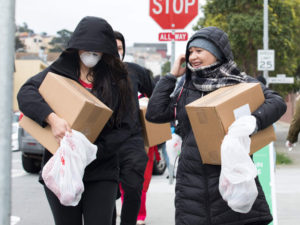
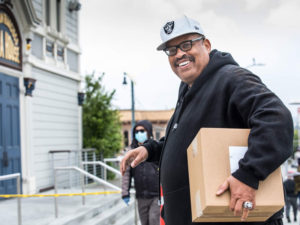
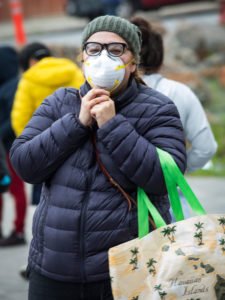
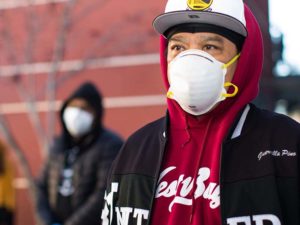
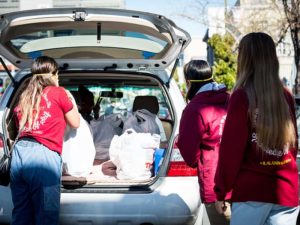
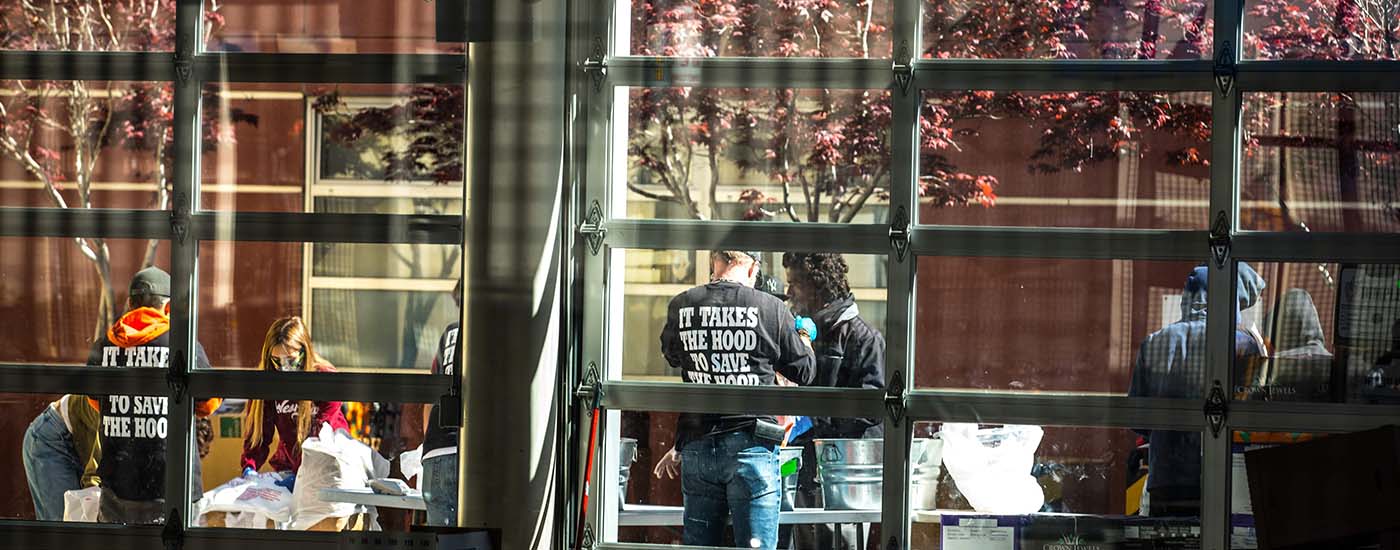
Share